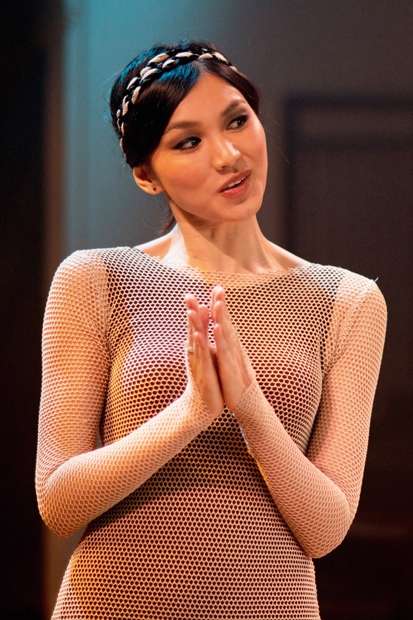It’s an unlovely venue, for sure. Charing Cross Theatre, underneath the arches, likes to welcome vagrant plays that can’t find a home elsewhere. The dripping exterior, opposite a gay love-hub named Heaven, feels as if it’s paved with tears. The foyer is scented with mildewed chip fat and the ink-black auditorium looks like a closed-down fleapit from the 1950s. Perhaps this air of neglect explains why few of its productions win rave reviews. Keeler, starring Paul Nicholas, got an unfair monstering.
The play is an absorbing docudrama, which explores the relationship between Stephen Ward and his protégée Christine Keeler. Their flatshare was a complex and unusual set-up. Ward was multitalented, socially ambitious, intelligent, charming and articulate. Keeler was a wide-eyed good-time girl with nothing but her ravishing physique to propel her forward. They were mates. He liked her company and he relished his role as father-protector. Though he fancied her, and offered to marry her, he refrained from sleeping with her. (He preferred Jamaican hookers.) He introduced her to rich old lechers and he accepted her money as well, but only to meet household bills. He used her, without doubt. But she used him too. This strange and touching conjunction of friendship and exploitation is caught superbly in Gill Adams’s script.
The scenes at Cliveden, where randy Tory bigwigs chased giggling nymphettes around the swimming-pool, are done equally well. Adams doesn’t invite us to mock or judge these priapic grandees and their simpering playmates. She presents them as they were — participants in a sophisticated game that involved exchanges on many levels. Sex and cash were, of course, part of the trading system but it also featured friendship, glamour, social advancement and the intoxicating aroma of power.
Paul Nicholas brings authority, sympathy and a certain fading sexiness to Stephen Ward. His voice is a marvel to hear. The trilling pop-star tenor has matured into a rich and sonorous purr. (Book him for a sherry commercial, somebody!) He brings out the quintessential tragedy of Ward, who made a simple error of orientation. He was living in the wrong century and didn’t realise it. He spent his life building ‘a position in society’, as it used to be known, but the entire structure was about to totter and fall. The only position he held was as the stick of dynamite that caused the crash.
The production, which Nicholas also directs, is not fault-free. The sets wobble a bit. The musical interludes refuse to dovetail neatly with the action, and not every performance is drawn from the finest quarter of the profession. Stunning Sarah Armstrong is superbly cast as the young Keeler. Stacy Leeson, playing Mandy Rice-Davies, is so brassy she could polish a doorknocker just by looking at it. The play’s great achievement is to encapsulate an entire epoch on its deathbed. In the final scene, the gorgeous strumpets emerge from the stuffy, bowler-hatted, black-and-white world that bore them. They’re like a pair of butterflies rising from a Victorian graveyard at the first breath of spring.
Timberlake Wertenbaker has decided that Sophocles’ Ajax needs a spot of restoration. She began her revisions, she says, during ‘three weeks in the Basque Country, deep in dictionaries, fed by kind friends’. The play is Sophocles’ earliest surviving work and it goes like this. Ajax, in a jealous rage, decides to kill his rival, Odysseus. Athena tricks him into slaughtering sheep instead. Humiliated, Ajax commits suicide and his comrades argue over the burial of his body.
Sophocles’ aim here is to blend high tragedy with crowd-pleasing comedy: the sight of a Greek superhero killing farm animals by accident would have had the punters rolling in the aisles at the Theatre of Dionysus Eleuthereus in Athens in 450 BC. But this is a difficult, unpolished effort, and to make sense of its great tangle of gods and men, of farce and melodrama, of magic and morality, would stretch the abilities of any dramatist.
Wertenbaker has shifted the whole caboodle to Afghanistan, where the British army is engaged in a bust-up with its bully-boy American allies. Crikey. Talk about muddying the waters. The result is layer upon layer of impenetrable complexity. Dead goats, blood-soaked tents, roaring lunatics, mad, pelvic-wiggling dance numbers. The play lurches from one baffling gesture to another. At one point a British officer (named Odysseus rather than Rupert) crawls around on all fours disguised in animal skins.
Glimmers of brilliance shine through the mire. Gemma Chan makes a highly alluring Athena and her costume of skin-coloured webbing is adorably stylish. Joe Dixon’s tooty-fruity diction as Ajax is a little over-ripe but his raw physicality makes him highly watchable. But the script can’t survive its violent transplantation. One day, a genius will set a Trojan War play during the Trojan War. What a breakthrough that would be.







Comments